A Rhinoceros in Eighteenth-Century London November 5, 2011
Author: Beach Combing | in : Ancient, Medieval, Modern
Beach has a longstanding thing about elephants (see many previous posts and many posts to come) and has been wondering recently about opening up a second front on the rhinoceros: a distant reading of a text about Romans importing this beast for their games has been jumping up and down in his head. He […]
Suger’s Sherbert Holder October 13, 2011
Author: Beach Combing | in : Medieval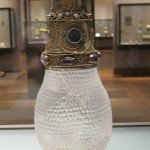
In previous posts Beachcombing has celebrated objects that have long and interesting histories: take, for example, the Baltic buddhas, Cellini’s canon or the Dauphin’s heart. It was with some excitement then that he just recently stumbled upon a vase that made, in the Middle Ages, its way from Moorish Spain through the hands of several […]
Tute’s Glass Ball September 27, 2011
Author: Beach Combing | in : Ancient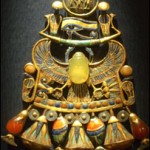
Beach is in a meteor mood again and has been flicking back through his notes to some particularly interesting cases that Andy the Mad Monk sent him last year. Andy, in fact, provided a series of remarkable examples but Beach’s favourite is probably this curious case from ancient Egypt. In the picture above we see […]
An Ecclesiastical Harem from Eighteenth-Century Spain August 21, 2011
Author: Beach Combing | in : Modern
The Inquisition it can’t have been that easy. Mass in the morning, torture in the afternoon and, yet another blasted auto da fe in the evening… Who can blame the good men with the blood red cloth if sometimes they decided to create, let’s call it, ‘recreational space’ for themselves. This extraordinary – and apparently […]
A Celtic Tribe in Kazakhstan? July 29, 2011
Author: Beach Combing | in : Ancient
When Beach was still a green blogger – before he had learnt about spiders, search engine optimization and RSI feeds – he spat out a little post about a group of Celtic hoodlums who, as mercenaries, travelled around the Mediterranean causing havoc everywhere they went. Beach sold this as a Wrong Place post: an example […]
Anglo-Saxons in Southern India? July 15, 2011
Author: Beach Combing | in : Medieval**Beachcombing dedicates the following to DGM, who has an excellent post on this subject** For those like Beachcombing who lick their lips at descriptions of long and unlikely journeys in antiquity and the middle ages there are few more exciting sentences than this one-liner in some versions of the Anglo-Saxon Chronicle. In the year 883, […]
Cellini’s Canon April 20, 2011
Author: Beach Combing | in : Modern
Beachcombing has been thinking in the last hour about objects that are far travelled – for example the Indian buddhas that made it to Viking Scandinavia or, say, the Viking coin that (allegedly) ended up in pre-Columbian Maine. And it was while musing on these far-flung things that Cellini’s canon came to mind. Now admittedly […]
Woolly Mammoths among the Pharoahs? April 14, 2011
Author: Beach Combing | in : Ancient, Medieval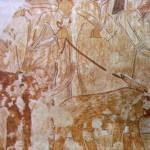
**This post is dedicated to Andy the Mad Monk who put Beachcombing onto it** Beachcombing has long wondered if the publishing world would not have room for a volume on long-travelled exotic animals in Antiquity and the Middle Ages: giraffes turning up in Renaissance Italy; polar bears being brought down to the medieval Arabs; […]
Thirteenth-Century French Envoys in Mongolia February 19, 2011
Author: Beach Combing | in : Medieval
As Beachcombing plunges into his spring flu a short but sweet post on an extraordinary diplomatic mission that Louis IX (obit 1270) sent to the King of the Mongols in the thirteenth century. There is something necessarily surreal about any contacts between such distant realms, though this did not stop the two monarchs plotting. Indeed, there had already […]
Third-Century Indian Coins in Twentieth-Century Ethiopia February 17, 2011
Author: Beach Combing | in : Ancient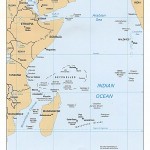
In 1940 a thrilling discovery was made at the Ethiopian monastery of Dabra-Dammo in northern Ethiopia. In the remains of a gold encrusted box in the holy house 104 Indian coins were identified. The coins were extremely valuable: the possibility that a practical joker – perhaps an Italian squaddie – brought these across in […]
Diodorus’ Island February 10, 2011
Author: Beach Combing | in : Ancient
Perhaps next to Forgotten Kingdoms Beachcombing should set up a tag on Invisible Kingdoms: realms that very likely only ever existed in the imagination of ancient and medieval writers. There would be Atlantis, of course, the land of Prester John, the Seven Cities of Gold and El Dorado. And to these it would be a cinch […]
The Allendale Wolf January 24, 2011
Author: Beach Combing | in : Modern
As this has been the season of the werewolf Beachcombing thought that today he would introduce the last English wolf, for yes, unfortunately the British Isles no longer have any of the howling ones. The conventional answer – and Beachcombing, in happier days, planned a book on British Dodos – is that the last English […]
First Greek Encounter with a Parrot December 30, 2010
Author: Beach Combing | in : Ancient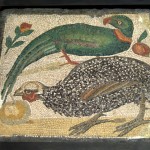
In the ancient Mediterranean parrots were an exotic bird. They were rare, they were multicoloured and they could even repeat human words more convincingly than the native mimics: starlings, magpies and nightingales. Understandably, then, when they appeared, they were attention-grabbers. Indeed, in some periods of antiquity Beachcombing can barely read a source without tripping […]
Homer Hasenpflug Dubs and Roman Legionaries in Ancient China December 20, 2010
Author: Beach Combing | in : Ancient
Drum roll, trumpet blast enter Homer Hasenpflug Dubs (obit 1969) an American-born Oxford don with a name that sounds as it it was purloined from an 1890s feel-good novel. Homer, to friends, was a capable if eccentric sinologist based out of ‘the other place’ for most of his teaching life. He wrote – as was […]
A Medieval Buddha at St Pancras Station? December 16, 2010
Author: Beach Combing | in : Medieval, Modern
Beachcombing is rapidly coming down with flu at the moment and so will have to satisfy himself with a short post today. He will, in fact, take the reader to nineteenth-century central London, at a time when St Pancras Station (opened 1868) was being built up and connected. Beachcombing – sick or well – loves stations because they are vortexes of anarchy and […]


